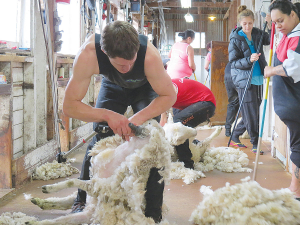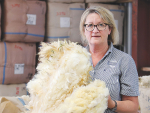Last week, Sissons launched three micro-credential courses at the Primary Industries Summit in Wellington – Introduction to the Woolshed, Learner Wool Handler and Learner Shearer.
She says the courses are ‘bite-size’ pieces of learning, aiming to recognise or teach specific skills for the workplace, on the job and in a short time.
“What makes the issue so pressing, and why the wool industry is one of the first to have micro-credentials, is that right now there are no recognised industry qualifications available in New Zealand for shearers and wool handlers,” Sissons says.
“This is incredibly important for the wool industry, and it’s an example of one of the future directions of training for all primary industries.”
She says with job openings forecast to grow substantially in wool harvesting in the coming years, training will be critical as NZ faces competition from overseas for our shearers and wool handlers.
Sissons reckons micro-credentials are a game-changer for the primary industries. These are short, sharp pieces of learning, officially recognised and overseen by NZ’s education system.
“We know our industries are all crying out for people -- preferably already skilled, but if not they’re prepared to invest to develop the skills they need on the job,” she says.
“The real shift we’re working on is the focus on skills rather than big up-front qualifications. A micro-credential puts the emphasis on `just in time’ learning, rather than a lengthy `just in case’ qualification.”
The wool courses total about four weeks of learning, practising and assessment.
“They mean businesses can bring on new workers and ensure they develop essential skills for the woolshed before further training,” Sissons says.
“It also recognises that shearing gangs move around a lot. Workers can learn wherever they are and fit it in whenever best suits the job.”
Sisson says that despite there having been no recognised entry level wool harvesting qualifications, people have been learning on the job from experienced colleagues. But she believes the micro-credentials will help provide workers with a base level of skills and a qualification to show employers.
Primary ITO is this year developing a range of wool harvesting programmes, in addition to the micro-credentials, which are expected to be launched in 2020.
https://www.primaryito.ac.nz/courses-for-you/meat-and-fibre/wool-harvesting



















